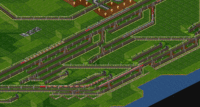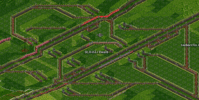Difference between revisions of "LRxLR mainlines"
From #openttdcoop wiki
m (Spelling and grammar) |
|||
| Line 3: | Line 3: | ||
==General== | ==General== | ||
[[Image:LRxLR01.png|thumb|right|200px|2 lanes joining a mainline]] | [[Image:LRxLR01.png|thumb|right|200px|2 lanes joining a mainline]] | ||
| − | LRxLR mainlines are the newest | + | LRxLR mainlines are the newest product of my idea-o-factory. The concept was born from the idea to have a LR mainline on each long side of a 256x1024 map but then I liked the idea of a 4 line ML more. And of the idea of some realism ;). |
==Practical appliances== | ==Practical appliances== | ||
'''Pros:''' | '''Pros:''' | ||
| − | * Joiners which allow a | + | * Joiners which allow a choice are quite easy to make. |
* Multiple trains passing each other on a close distance look awesome. | * Multiple trains passing each other on a close distance look awesome. | ||
* The biggest part of a hub is in between the two sides of the mainline. | * The biggest part of a hub is in between the two sides of the mainline. | ||
| Line 17: | Line 17: | ||
==Load balancing== | ==Load balancing== | ||
[[Image:LRxLR02.png|thumb|left|200px|A LRxLR backbone hub]] | [[Image:LRxLR02.png|thumb|left|200px|A LRxLR backbone hub]] | ||
| − | I dedicated a section to this because [[User:Mucht|Mucht]] wanted to know if load balancing has become easier with LRxLR mainlines. I will first | + | I dedicated a section to this because [[User:Mucht|Mucht]] wanted to know if load balancing has become easier with LRxLR mainlines. I will first summarize the differences with a normal load balancer. One of the main differences is that it is actually easier to come between the two lines you want to put a load balancer between as you've got quite some space between the mainlines usually. This space also has a negative effect: the lines of the chooser need to become quite big (see the big V-shaped things in the north east of [[LRxLR02.png|this backbone hub]]). This makes it more likely that trains will enter your priority line in the meantime and stop your joining train, blocking the line behind it. I developed [[LRxLR04.png|this priority]] for that, it is only used once in the entire Public Server game now. |
There is also the problem that you have to cross an opposing line, this can be solved by adding tunnels to the whole situation but that makes the joiner a bit more complicated. | There is also the problem that you have to cross an opposing line, this can be solved by adding tunnels to the whole situation but that makes the joiner a bit more complicated. | ||
| Line 32: | Line 32: | ||
==Conclusion== | ==Conclusion== | ||
LRxLR mainlines are just as good as LLxRR mainlines and it makes room for new inventions now as we only had 1 game yet. It also makes room for some nice looking hubs, it also has some very interesting new load balancers. My personal improvement about LRxLR mainlines is that it looks awesome to see 4 lines next through each other in a valley with loads of trains on it. | LRxLR mainlines are just as good as LLxRR mainlines and it makes room for new inventions now as we only had 1 game yet. It also makes room for some nice looking hubs, it also has some very interesting new load balancers. My personal improvement about LRxLR mainlines is that it looks awesome to see 4 lines next through each other in a valley with loads of trains on it. | ||
| − | The downsides on LRxLR | + | The downsides on LRxLR are that hubs become quite large and you need to flatten a lot of land for them. Another downside is that most regular things have to be re-invented, and the Public Server where we tested this concept isn't a good place for that. |
| − | In the end it was just a great piece of research, beginning with the idea of very simple mainlines (LR) and extending that and actually testing it in a Public Server game where it is | + | In the end it was just a great piece of research, beginning with the idea of very simple mainlines (LR) and extending that and actually testing it in a Public Server game where it is guaranteed to get lots of trains on it. It also delivered us with some great new things like the improved joiner. Maybe we need to test LRxLR mainlines in the Member Zone where it is a more controlled environment and we get a better chance to do a full research. |
[[Category:Research]] | [[Category:Research]] | ||
Latest revision as of 19:56, 7 July 2007
by XeryusTC
General
LRxLR mainlines are the newest product of my idea-o-factory. The concept was born from the idea to have a LR mainline on each long side of a 256x1024 map but then I liked the idea of a 4 line ML more. And of the idea of some realism ;).
Practical appliances
Pros:
- Joiners which allow a choice are quite easy to make.
- Multiple trains passing each other on a close distance look awesome.
- The biggest part of a hub is in between the two sides of the mainline.
Cons:
- Everything becomes quite big.
- Tends to be confusing sometimes.
Load balancing
I dedicated a section to this because Mucht wanted to know if load balancing has become easier with LRxLR mainlines. I will first summarize the differences with a normal load balancer. One of the main differences is that it is actually easier to come between the two lines you want to put a load balancer between as you've got quite some space between the mainlines usually. This space also has a negative effect: the lines of the chooser need to become quite big (see the big V-shaped things in the north east of this backbone hub). This makes it more likely that trains will enter your priority line in the meantime and stop your joining train, blocking the line behind it. I developed this priority for that, it is only used once in the entire Public Server game now. There is also the problem that you have to cross an opposing line, this can be solved by adding tunnels to the whole situation but that makes the joiner a bit more complicated.
I personally think that it is easier to load balance, you still have some of the main difficulties of load balancing on a LLxRR mainline, but it has the benefit of using the space in between the two sides of the mainline so you don't waste space on it's outside.
Research
| Idea | Player | Draft of idea | Testing | Completed | Remarks |
|---|---|---|---|---|---|
| LRxLR mainline | XeryusTC | Done | Done | Done | They look awesome when close together |
| LRxLR hubs | XeryusTC | Done | Multiple hubs build | Done | They seem to be as good as normal LLxRR hubs |
Conclusion
LRxLR mainlines are just as good as LLxRR mainlines and it makes room for new inventions now as we only had 1 game yet. It also makes room for some nice looking hubs, it also has some very interesting new load balancers. My personal improvement about LRxLR mainlines is that it looks awesome to see 4 lines next through each other in a valley with loads of trains on it. The downsides on LRxLR are that hubs become quite large and you need to flatten a lot of land for them. Another downside is that most regular things have to be re-invented, and the Public Server where we tested this concept isn't a good place for that. In the end it was just a great piece of research, beginning with the idea of very simple mainlines (LR) and extending that and actually testing it in a Public Server game where it is guaranteed to get lots of trains on it. It also delivered us with some great new things like the improved joiner. Maybe we need to test LRxLR mainlines in the Member Zone where it is a more controlled environment and we get a better chance to do a full research.


